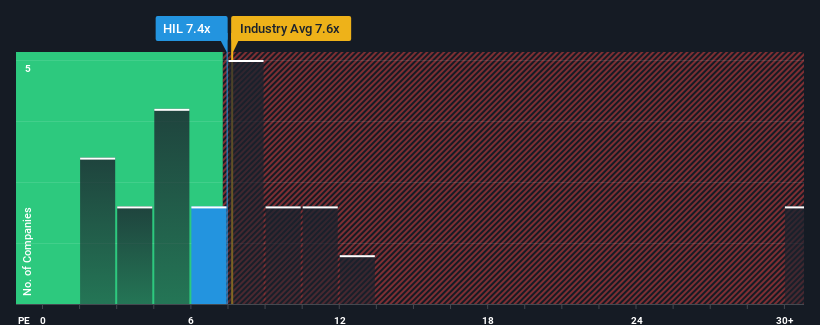- South Africa
- /
- Specialty Stores
- /
- JSE:WVR
Getting In Cheap On HomeChoice International plc (JSE:HIL) Is Unlikely
There wouldn't be many who think HomeChoice International plc's (JSE:HIL) price-to-earnings (or "P/E") ratio of 7.4x is worth a mention when the median P/E in South Africa is similar at about 9x. Although, it's not wise to simply ignore the P/E without explanation as investors may be disregarding a distinct opportunity or a costly mistake.
Recent times have been quite advantageous for HomeChoice International as its earnings have been rising very briskly. It might be that many expect the strong earnings performance to wane, which has kept the P/E from rising. If that doesn't eventuate, then existing shareholders have reason to be feeling optimistic about the future direction of the share price.
Check out our latest analysis for HomeChoice International

How Is HomeChoice International's Growth Trending?
The only time you'd be comfortable seeing a P/E like HomeChoice International's is when the company's growth is tracking the market closely.
Retrospectively, the last year delivered an exceptional 53% gain to the company's bottom line. Still, incredibly EPS has fallen 4.6% in total from three years ago, which is quite disappointing. Therefore, it's fair to say the earnings growth recently has been undesirable for the company.
Weighing that medium-term earnings trajectory against the broader market's one-year forecast for expansion of 11% shows it's an unpleasant look.
With this information, we find it concerning that HomeChoice International is trading at a fairly similar P/E to the market. It seems most investors are ignoring the recent poor growth rate and are hoping for a turnaround in the company's business prospects. There's a good chance existing shareholders are setting themselves up for future disappointment if the P/E falls to levels more in line with the recent negative growth rates.
The Key Takeaway
We'd say the price-to-earnings ratio's power isn't primarily as a valuation instrument but rather to gauge current investor sentiment and future expectations.
We've established that HomeChoice International currently trades on a higher than expected P/E since its recent earnings have been in decline over the medium-term. Right now we are uncomfortable with the P/E as this earnings performance is unlikely to support a more positive sentiment for long. If recent medium-term earnings trends continue, it will place shareholders' investments at risk and potential investors in danger of paying an unnecessary premium.
We don't want to rain on the parade too much, but we did also find 5 warning signs for HomeChoice International (2 are concerning!) that you need to be mindful of.
Of course, you might also be able to find a better stock than HomeChoice International. So you may wish to see this free collection of other companies that have reasonable P/E ratios and have grown earnings strongly.
Valuation is complex, but we're here to simplify it.
Discover if Weaver Fintech might be undervalued or overvalued with our detailed analysis, featuring fair value estimates, potential risks, dividends, insider trades, and its financial condition.
Access Free AnalysisHave feedback on this article? Concerned about the content? Get in touch with us directly. Alternatively, email editorial-team (at) simplywallst.com.
This article by Simply Wall St is general in nature. We provide commentary based on historical data and analyst forecasts only using an unbiased methodology and our articles are not intended to be financial advice. It does not constitute a recommendation to buy or sell any stock, and does not take account of your objectives, or your financial situation. We aim to bring you long-term focused analysis driven by fundamental data. Note that our analysis may not factor in the latest price-sensitive company announcements or qualitative material. Simply Wall St has no position in any stocks mentioned.
About JSE:WVR
Weaver Fintech
Operates as a fintech company, provides financial services.
Proven track record with slight risk.
Market Insights
Community Narratives



